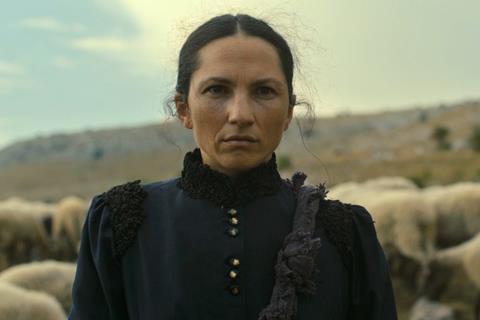This slow-burn drama stars Manuela Martelli as an enigmatic stranger

Dir/scr: Hana Jusic. Croatia/Italy/Romania/Greece/France/Slovenia. 2025. 137mins
Dark and mysterious strangers are a reliable cinema staple, but Hana Jusic gives the device a shot in the arm by flipping the usual gender dynamic in this broody and intense second feature. In her evocative period piece — set early in the 20th century — it’s a woman (Manuela Martelli) who makes an unexpected appearance on a windswept Croatian hillside one stormy night, dressed in widow’s weeds and carrying only a small cloth bundle and a Bible.
Jusic is in no hurry to reveal any secrets
Also on her own is Milena (Ana Marija Veselcic), a young woman who has been left at home by her shepherd brothers while they take their animals to graze. Everything about the incomer, who says her name is Teresa and claims she is the widow of Milena’s brother Marko, is alien to Milena, not least the Spanish language she speaks. But she also offers the intriguing possibility of non-judgemental companionship in a lonely place.
This encounter is just the start of Jusic’s slow-burn consideration of power dynamics and the patriarchy — themes she also examined in her debut Quit Staring At My Plate. In God Will Not Help these are adeptly interwoven with additional themes, including overdue coming-of-age, the yearning to communicate, and crises of faith. God Will Not Help has the feel of a literary adaptation along the lines of Bronte at times — and, at other moments, a western — but its concerns retain a strikingly modern feel. Playing in competition in Sarajevo after its world premiere in Locarno, the film appears to have bright future festival prospects, while its rugged good looks and mysterious aspect could help it catch the eye of arthouse distributors.
Jusic takes her time to develop the initial pairing before bringing additional characters into the mix. Teresa picks up a handful of words of Croatian, but Jusic is careful not to make her suddenly fluent. The lack of complete connection allows the women to use one another as both sounding board and confessional, an idea that Jusic explores throughout. Milena, who we learn is treated as a whipping boy by her family, is thrilled to finally have someone willing to listen to her even if she isn’t fully understood.
Jana Plecas’ camera, coupled with bleak and windy sound design from Marius Leftarache, bring home the harshness of the mountains, also reflected in the weather-induced chaps and cuts we see on the actors’ faces. The sense of isolation is further reinforced in moments when characters are talking, as the camera drifts away from them, either considering other things happening in the surroundings or, via sparingly employed dream-sequence moments, shining a light on Teresa’s inner psychology. Although rooted in real-world drama, the atmosphere dances close to horror in places, with the far-from-period electro scoring from Stavros Evangelou, Iris Asimakopoulou and Vasilis Chontos adding to the unsettling feel.
Gradually, men enter the picture. First it’s Marko’s juvenile and aggressive younger sibling Nikola (Mauro Ercegovic Gracin), who views Teresa as a potential wife and ticket to inheriting his dead brother’s share of the stock. Then, the trio head up the mountain to join Marko’s elder brother Ilija (Filip Djuric), a man of faith who senses a kindred spirit in Teresa, and his no-nonsense wife Djuka (Tina Orlandini), who is grateful for another pair of hands. The men’s cousins (Niksa Butijer and Ivan Skoko) prove to be considerably more suspicious, viewing her as a bad omen.
Teresa remains magnetic because she is so ambivalent, questions over her intentions and backstory propelling the film along, even though Jusic is in no hurry to reveal any secrets. Martelli, whose name may be familiar to international audiences as the director of 1976, keeps her character tightly wound while letting her internal doubts rise and fall from view.
The lack of direct communication makes Teresa a catalyst. She’s a vessel into which other characters can pour their hopes and dreams. In many ways, Teresa is not unlike the unresponsive God whom she repeatedly prays to and who is surely part of the patriarchy, too. In the end, Jusic suggests, He may only help those who help themselves.
Production company: Kinorama
International sales: New Europe Film Sales, info@neweuropefilmsales.com
Producer: Ankica Juric Tilic
Screenplay: Hana Jusic
Cinematography: Jana Plecas
Production design: Laura Boni
Editing: Jan Klemsche
Music: Stavros Evangelou, Iris Asimakopoulou, Vasilis Chontos
Main cast: Manuela Martelli, Ana Marija Veselcic, Filip Duric, Mauro Ercegovic Gracin, Niksa Butijer, Tina Orlandini, Ivan Skoko, Bogdan Farcas, Vinko Kraljevic
























